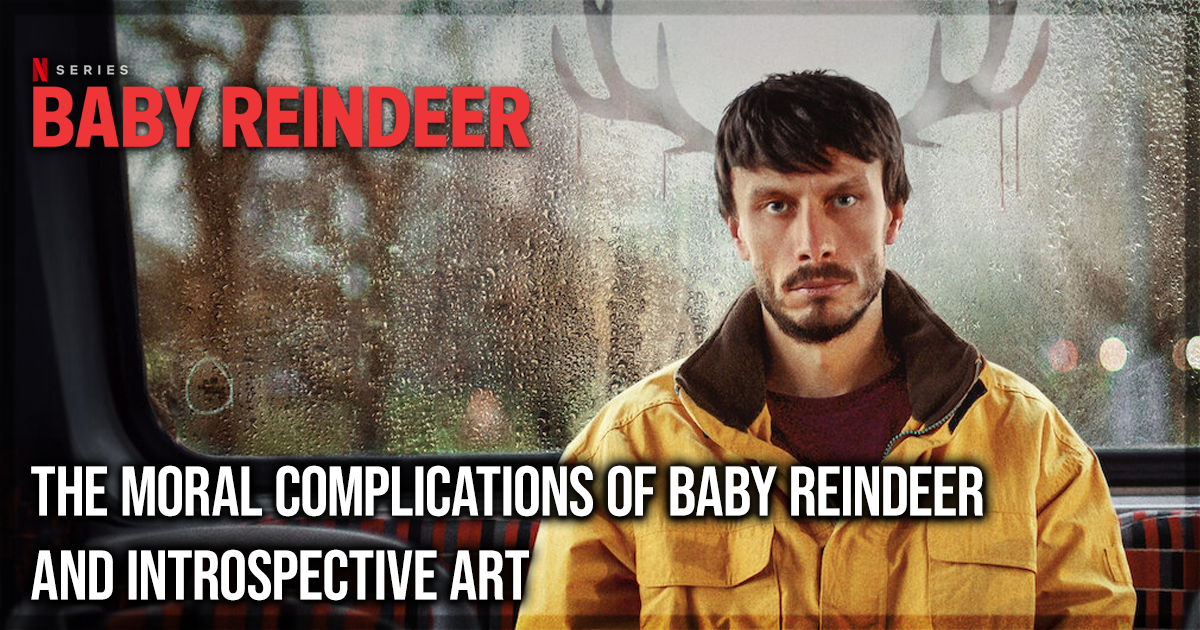It seems you can’t turn a corner at the moment, whether online or in your social circles, without someone mentioning Netflix’s new hit Baby Reindeer, a psychological thriller-cum-dark comedy about a man and his stalker. The show, which chronicles the ‘true’ story of protagonist Donny Dunn (Richard Gadd), a failing comedian who is being stalked by former lawyer and mentally ill Martha (Jessica Gunning), was originally a play performed by comedian Gadd at the Edinburgh Fringe Festival. It is introspective to Gadd’s tribulations as a victim to a fault.
That fault being where does his artistic licence start and where does it end when it comes to using the actions of a mentally ill person as a framework for processing his own trauma through art that is designed to be entertainment. This is the moral complication to art, and especially art as emotionally raw as Baby Reindeer appearing on Netflix, arguably the biggest streaming platform of entertainment on the planet. It’s a topic much debated, especially on authenticity and the necessity of accuracy when creating biopics, but Baby Reindeer permeates an intriguing line on unreliable authorship and introspective art.
[Editor’s note: There are spoilers for Netflix’s Baby Reindeer ahead.]
Gadd as Victim, Gadd as an Artist
Gadd’s retelling of the four years he was stalked by the Scottish ex-lawyer is thrilling fun to witness from an outside perspective; the man turns out to be a phenomenal story-teller. His narration over his own emotive, glassy eyes allots the show an immersive strength. It has that same pervasive addiction that true crime documentaries have over audiences, but this is, for all intents and purposes, not your standard true crime. It is true crime, in essence, but instead of telling a story of a victim and their ordeal through the lens of supposed objectivity, Baby Reindeer is presented through the lens of its victim, who takes his own story and extrapolates it into entertainment.
With that comes its own considerations on how reliable of a narrator can we determine Gadd to be. Baby Reindeer – named after the pet name Martha calls Donny throughout the show and within the cascade of emails she sends – is an exploration of Gadd’s internal confusion around sexuality and the mental navigation he must do after he is sexually abused by a male producer in the Film and TV industry during his search for stardom and fame.
It is remarkable to see a man, who comes to minor terms with his rape and sexuality during the show, be vulnerable in this way. He places all of his flaws and mistakes front and centre, for us to observe and critique, but also yearn for. To have the ability to be so brutally honest about one’s own self-hatred, a hatred that is ingrained within queer people from a society that has demonized us for years (and continues to do so), is not something seen often and was therapeutic for one to hear. It makes the show a prickly and fascinating endeavor, engaging our moral compass regarding where his actions sit.
Is the abuse he faced then enough of a hardship that his shame around being attracted to a trans woman or his egotistical desire to keep the mentally unwell Martha at just enough length to satisfy his craving for attention justifiable? It’s a unique way of telling and framing a personal story, sure, and it makes the series a kind of roaringly good and addicting art. But that the show comes from Gadd, and is available on a platform like Netflix (one where pulpy true crime is commonplace) leans the show less towards the read that he is being brutally honest about his own foibles, and more into a sense of performative vulnerability.
Performative Vulnerability or Artistic Honesty?
The story hits the honest emotional beats of the story, as Gadd reiterates in interviews after the Netflix show hit the number one slot on the platform, but to avoid the UK’s libel laws and out of respect for the people in the story, changes to people and places were made. Sadly, these measures were not enough as it took a mere three days of its public release for the true identity of Martha to be sleuthed out by audiences, and, as of writing, they are seeking out the trans woman whom Gadd dated throughout (played in the show by Nava Mau) and the TV writer/ producer who abused and raped Gadd.
This act is almost solely on the audience not respecting the boundaries between the art and the subject that it perceives. However, Gadd – as victim and artistè – makes subtle, definitive, and potentially problematic choices in how he chooses to write his stalker. He invokes the maniacal antagonist of Stephen King’s Misery (played by Kathy Bates in the 1990 film) along with portraying Martha as a pseudo-Susan Boyle on Britain’s Got Talent archetype: A middle-aged fat woman with an abrasive demeanor, a Scottish brogue and what appears to be a lack of social skills. Of course, Gadd sees the woman who bombarded him with thousands of voicemails and emails – all of which feature the unnerving footnote ‘sent from my iPhone’ when she is deliberately never shown to own one – and told his parents he was dead and physically assaulted him as exactly that: a caricature of torment.
It’s in this portrayal that seems to have given a sense of entitled permission for the audience to insert themselves into the real-world narrative. The real Martha, imprisoned for her crimes, has surely not had a say in how she is portrayed. I can’t imagine she watched the show and consented to Gunning’s electrifying and sinister presence in Gadd’s semi-fictitious rendition of his trauma, while I thoroughly believe his father’s implied molestation at the hands of the Catholic Church was consented to.
The show and Gadd go to great lengths to recognize the mental illness present within Martha but are still content with using her actions as a form of gallow humor. If Martha is to also be seen as a victim – of the system failing her – why is he choosing to expose the depraved actions that her mental illness caused her to commit? It negates the seemingly more honest approach that the show has towards Gadd’s trauma, because Gadd is only sparingly interested in her feelings in the grand scheme. Otherwise, why make a TV show flouting her emails verbatim and her voicemails publicly if he has any sort of compassion towards the real Martha.
Gadd’s Catharsis vs. Martha in Baby Reindeer
The show is Gadd’s confessional booth, his sins laid bare for flagellation. But it is still a show, and Gadd will now no doubt gain the fame that his search for once led him to accept and compartmentalize abuse. Processing your trauma so candidly and on such a scale, on such a platform, has no doubt been cathartic for Gadd, but it’s difficult to marry the dual sides that he is presenting – the fame hungry comedian with such an egotistical desire for attention that he maintains a relationship with his stalker presented in the show and someone who is still attempting to process trauma.
A cynical mind says that Gadd has finally gotten what he wanted, and it’s been done while using the mental illness of his stalker as a framing device for his own anguish. Gadd, forever the entertainer, can’t help himself, and while the real Martha probably did all the things shown in the show in some capacity, she deserves more respect than Gadd’s rose-tinted memories can offer us as an audience.
Gadd, Kurosawa, and the Unreliable Narrator
Gadd’s introspection begets the question of authorship over truth in the name of art. The famous, much-replicated film from Akira Kurosawa Rashomon tackles this. A film where each person who becomes the narrator tells the same story in a way that places themselves in a better light than another person within the story. Is that what Gadd is doing here? Should we take Gadd at face value because he is admitting his faults while simultaneously representing other people in ways that they may not have permitted so?
Where is the moral line that delineates what can and should be told in one artist’s vision, especially when that vision is presented as candid and cathartic? As great as Baby Reindeer is as a thriller and an insightful peer into queer repression (god knows we need more stories about bisexual men), that Gadd is in charge of the narrative around his stalker gives him enough power and motive to find mistruth and corruption a tempting prospect.
Baby Reindeer is now streaming on Netflix.
Learn more about Richard Gadd’s television series on the Netflix site.
You might also like…


